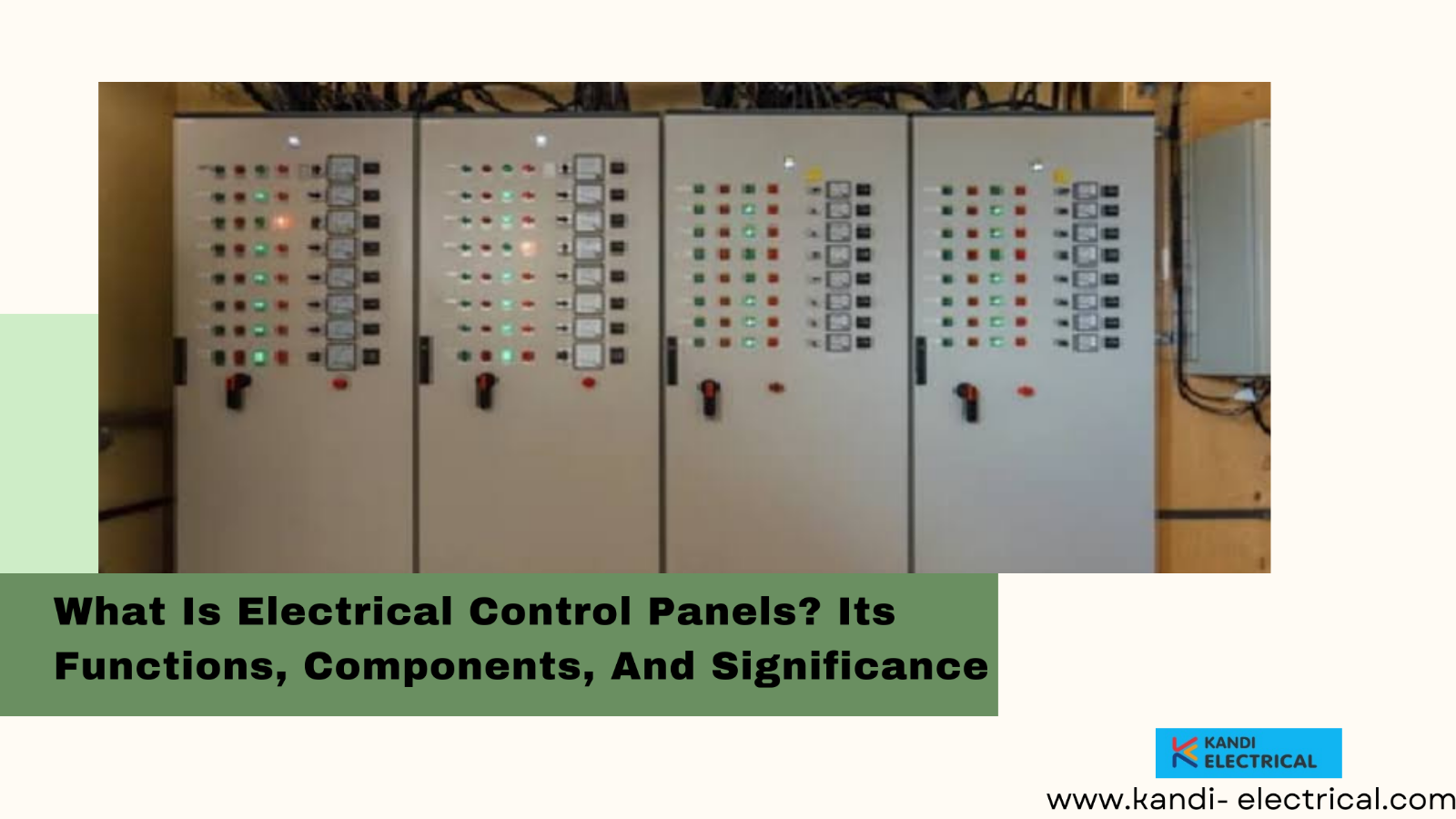
What Is Electrical Control Panels? Functions, Components, Significance
Kandi Electrical stands out as a leading Electrical Control Panel Manufacturers Delhi. With their focus on cutting-edge technology, customized solutions, stringent quality control, expert engineering, and customer support, they have garnered a strong reputation in the industry. Whether it's for industrial automation, power distribution, or process control, Kandi Electrical delivers innovative and reliable electrical control panels that meet the unique requirements of their clients. As a trusted name in electrical control panel manufacturing, Kandi Electrical is driving advancements and setting new benchmarks in Delhi's electrical industry.

In the realm of electrical systems and industrial automation, electrical control panels play a crucial role in managing and controlling various electrical components. These panels serve as the nerve center, housing electrical devices, switches, circuit breakers, and other equipment necessary for the safe and efficient operation of machinery and systems. In this blog post, we will delve into the world of electrical control panels, exploring their functions, components, and significance in industrial applications.
Function and Purpose
Electrical control panels serve as command centers for managing and controlling electrical systems. They are designed to house and organize electrical components, providing a centralized location for monitoring and operating various devices. The primary functions of an electrical control panel include:
- Circuit Protection: Control panels incorporate circuit breakers, fuses, and other protective devices to safeguard electrical equipment from overload, short circuits, and other electrical faults. These protective mechanisms ensure the safety of personnel and prevent damage to the machinery.
- Power Distribution: Control panels distribute electrical power from the main source to the connected equipment or machinery. They feature busbars or terminal blocks to distribute power to different circuits, enabling precise control and management of power flow.
- Control and Automation: Control panels are equipped with switches, relays, and other control devices to regulate the operation of motors, pumps, valves, and other electrical components. They provide a means to start, stop, and adjust the functioning of equipment, enabling automation and efficient control of industrial processes.
Components of an Electrical Control Panel
Electrical control panels consist of several key components that work together to ensure proper control and management of electrical systems. Some common components include:
- Main Disconnect: This is a switch or circuit breaker that allows the complete disconnection of power to the control panel for maintenance or emergency shutdown purposes.
- Circuit Breakers: These devices protect electrical circuits from overcurrent, short circuits, and electrical faults. They automatically trip or disconnect the circuit in the event of an abnormal current flow.
- Relays: Relays are electromagnetic switches that respond to electrical signals and control the operation of various devices. They provide isolation between the control circuit and the load circuit.
- Contactors: Contactors are heavy-duty electrical relays used for controlling motors and other high-power devices. They handle high current loads and provide remote control capabilities.
- Indicators and Displays: These components include lights, meters, and digital displays that provide visual indications of system status, power usage, and other relevant information.
Significance in Industrial Applications
Electrical control panels are integral to the functioning of numerous industrial applications. Some notable applications include:
- Manufacturing: Control panels are extensively used in manufacturing facilities to control and monitor production lines, conveyor systems, robotic equipment, and other machinery.
- Process Control: Industries such as oil and gas, chemical processing, and wastewater treatment rely on control panels to regulate and optimize complex processes involving pumps, valves, sensors, and other instruments.
- Building Automation: Control panels are employed in commercial and residential buildings for managing lighting systems, HVAC (Heating, Ventilation, and Air Conditioning), security systems, and other building automation functions.
Conclusion
Electrical control panels are vital components in industrial automation and electrical systems. They serve as the central command centers, providing control, protection, and automation capabilities for various equipment and machinery. By incorporating a range of components, these panels enable safe and efficient operation while facilitating precise control and monitoring. From manufacturing facilities to process industries and building automation, electrical control panels play a crucial role in ensuring the reliable and optimized functioning of electrical systems, contributing to enhanced productivity, safety, and efficiency in a wide range of applications.
Kandi Electrical stands out as a leading Electrical Control Panel Manufacturers Delhi. With their focus on cutting-edge technology, customized solutions, stringent quality control, expert engineering, and customer support, they have garnered a strong reputation in the industry. Whether it's for industrial automation, power distribution, or process control, Kandi Electrical delivers innovative and reliable electrical control panels that meet the unique requirements of their clients. As a trusted name in electrical control panel manufacturing, Kandi Electrical is driving advancements and setting new benchmarks in Delhi's electrical industry.





